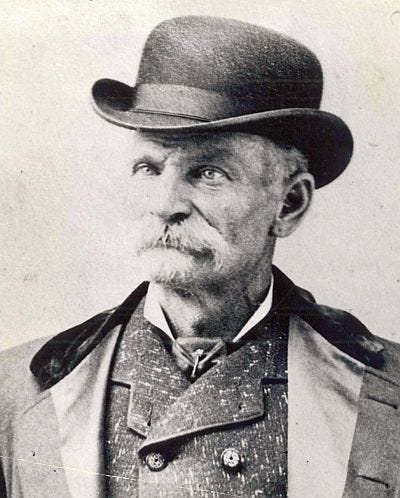The Criminal Career and Strange Disappearance of "Gentleman" Outlaw Charles "Black Bart" Boles
Charles “Black Bart” Boles robbed stagecoaches and left behind poetic messages to taunt authorities. The gentleman bandit who created his own legend then disappeared into the sunset...or did he?
It’s not often that a bandit decides to create his own nickname. However, “Black Bart” did just that. Known to his friends as Charley, the dapper, elegantly dressed gentleman chose the name after reading a popular dime novel of the day.
After all, he needed to have a way to sign the poetic messages he left behind after his robberies without giving away his true identity. The very idea of creating an alter ego made him chuckle.
Early Years
Surprisingly, Black Bart’s story began in England. Born in 1829, Charles E. Boles was the third of ten children (seven boys and three girls) born to John and Maria Boles (often spelled Bolles) of Norfolk, England.
When Charley turned two, his parents immigrated to Jefferson County, New York. John Boles had purchased a farm four miles south of Plessis Village near Alexandria Bay. It was here where Charley would grow up.
A life of crime was the furthest thing from Charley Boles’ mind. There were more exciting things in life to focus on, such as the California Gold Rush.
The allure of striking it rich drew Charley and two of his brothers to the American River in Sacramento in 1849. By 1852, without much success as prospectors, the trio returned to New York.
However, not long after that, Charley returned to prospecting with brothers David and Robert. Sadly, both of Charley’s brothers developed a fever and died soon after their arrival.
Undaunted, Charley remained in California for another two years before heading back East.
Marriage and Military Service
By 1854, Charley had married a woman named Mary Elizabeth Johnson. They had four children and, in 1860, were living in Decatur, Illinois.
When the U.S. Civil War broke out, Boles enlisted as a private on August 13, 1862, in Company B of the 116th Illinois Regiment. Records indicate that he was a good soldier and attained the rank of First Sergeant.
Boles would later be seriously wounded at the Battle of Vicksburg and also participated in Sherman’s march to the sea. On June 7, 1865, Charley was discharged and returned to his family.
Beginning of Criminal Career
After returning home from the war, Boles tried his hand at farming; however, the allure and excitement of prospecting never left him. Abandoning his family, Boles headed to Montana. Although he couldn’t have known at the time, outside forces would soon propel Charley into a life of crime.
In a letter to his wife in August 1871, Charley wrote that he’d had a very “unpleasant” encounter with some Wells Fargo & Company agents and vowed to get revenge.
What was this encounter that so turned Charley against Wells Fargo?
Boles and another prospector had discovered a profitable mine. A significant fact to know here is that a steady stream of water was crucial to bringing the gold to the surface.
Two men approached Boles and his partner and offered to buy the mine from them, although what they really wanted was the land. Charley refused. In retaliation, the men cut off his supply of water. Charley was then forced to abandon the mine.
Because the men were connected to Wells Fargo & Company, Charley vowed to “take steps.”







